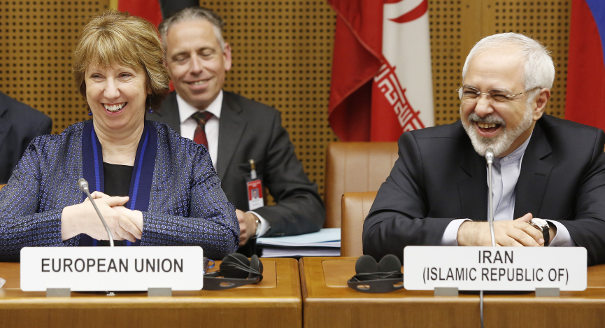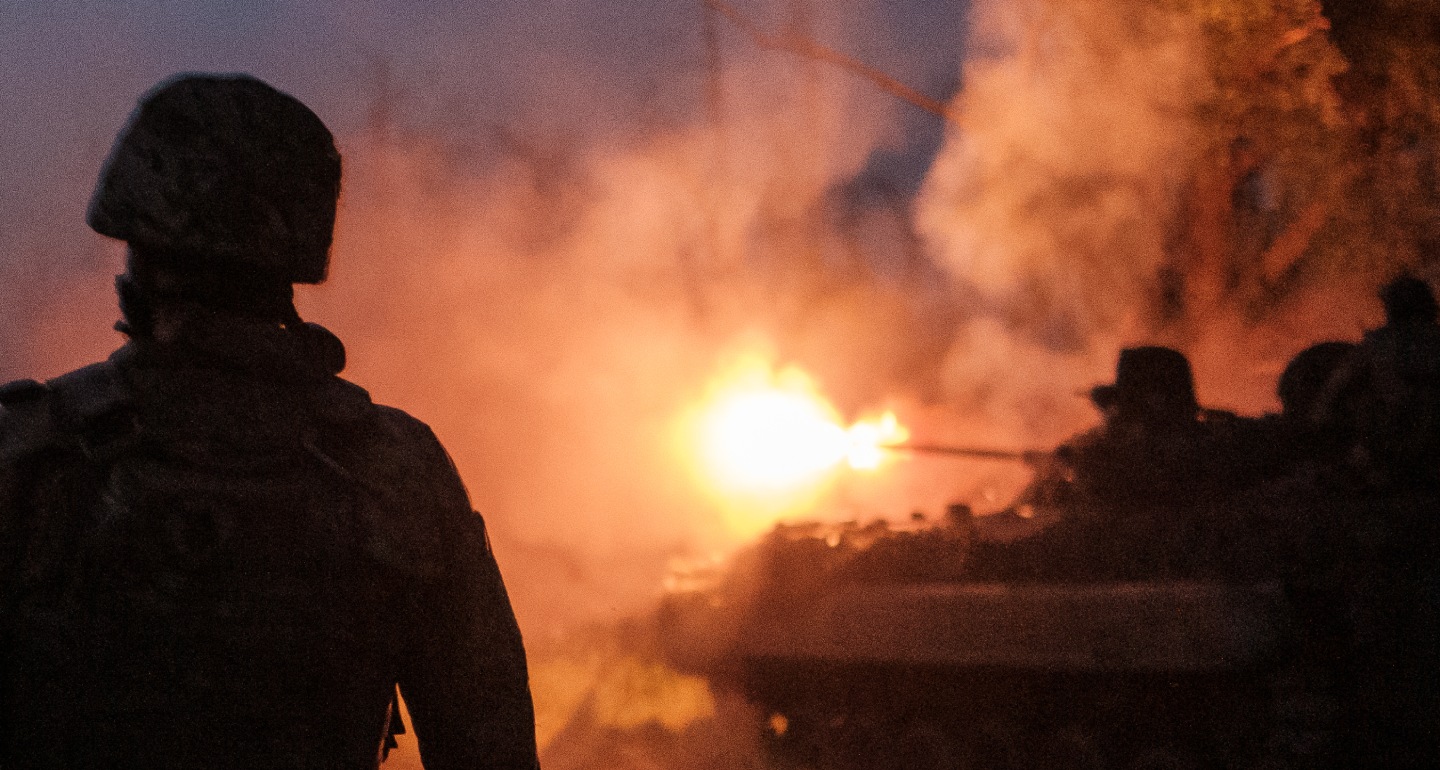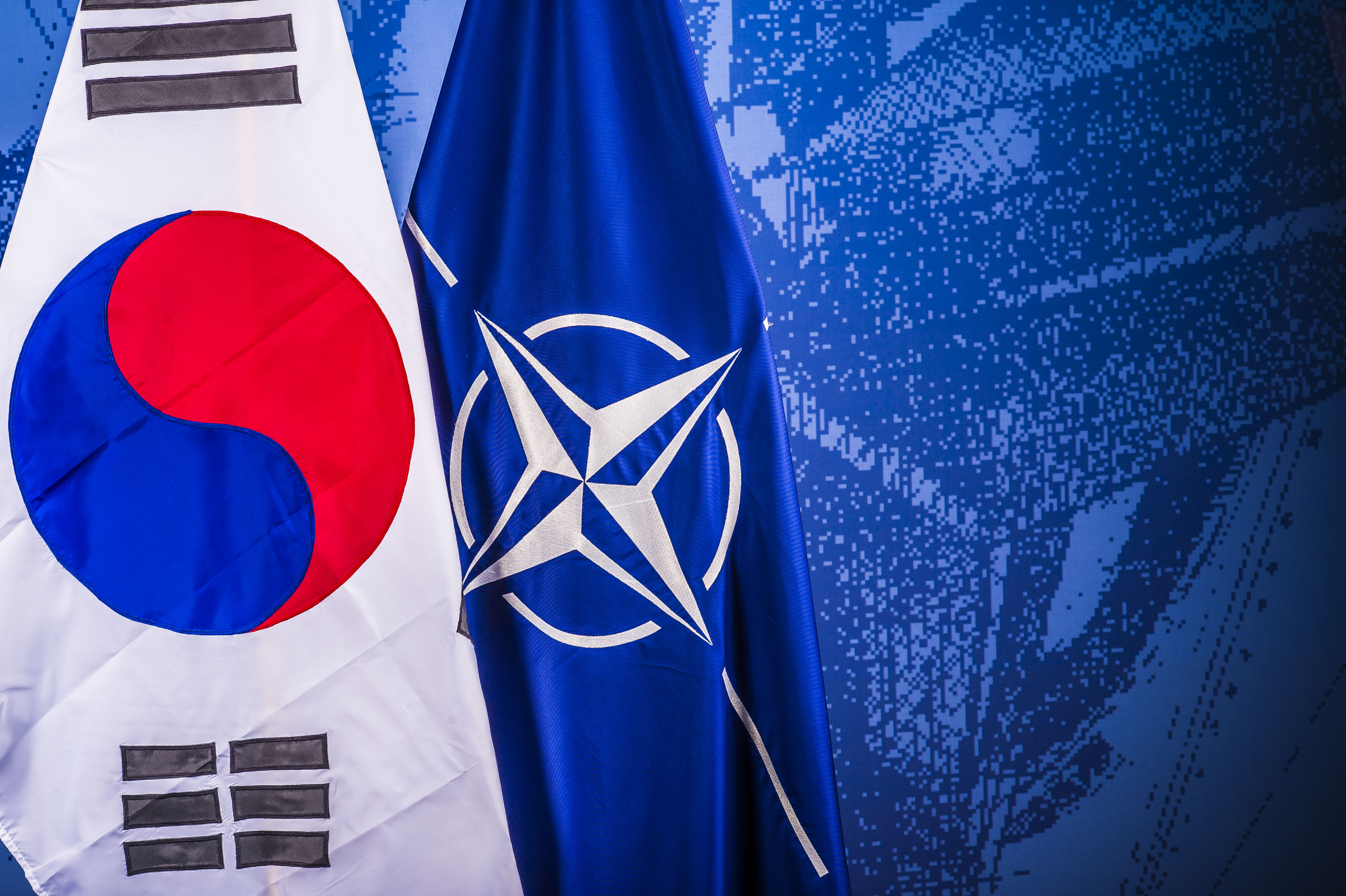The EU’s approach to Iran has emerged as one of the few successes of European foreign policy. In particular, the signing of an interim agreement in November 2013 that put limits on Tehran’s nuclear program for the first time marked a historic victory for EU diplomacy. Catherine Ashton, the EU’s top diplomat, continues to lead negotiations with Iran on behalf of the international community and aims to reach a “comprehensive” long-term agreement by late July 2014.
Even so, the EU is not thinking strategically. Despite the EU’s central position in the P5+1 talks, a strategic assessment of its overall approach to Iran reveals that Europe falls short. While the EU is good at what it is currently doing, it is ill-prepared for any change of events. Such a change could come if Iranian or American hardliners scuttle negotiations or if domestic Iranian politics or regional developments, such as the Syrian civil war or the situation in Iraq, turn increasingly violent. In the same category falls a (not entirely unlikely) U.S. failure to live up to its commitments to sanctions relief under a comprehensive deal.
Instead of considering strategies to pursue in the event of such disruptions, the EU—both its foreign policy arm, the European External Action Service (EEAS), and individual member states—has focused exclusively on concluding the negotiations. The EU has also not explored possibilities for broader engagement with Iran in the event of a successful outcome. Such possibilities range from an energy partnership to more constructive engagement on Syria to a renewed dialogue on human rights. Nor has it thought through the potential effects of even a short-term extension of the interim deal by anything between a few weeks to six months, which may create a severe backlash from the agreement’s original opponents, whether they are in the U.S. Congress or the Iranian Revolutionary Guard Corps, in Riyadh or Tel Aviv.
By refusing the look at anything beyond the nuclear issue, the EU runs the risk of seeing an agreement as an end in itself. While continuing its hard work on the final stages of the negotiations, the EU needs to develop a strategy for how to deal with Iran in the future.
On the Surface, an EU Success
When the Europeans—represented by the foreign ministers of France, Germany, and the United Kingdom (the E3)—first got involved in diplomatic negotiations with Iran a little more than ten years ago, they had three goals:
- Demonstrate the value of diplomacy and head off a possible military attack on Iran by the United States or Israel.
- Make a case for “effective multilateralism”—a cornerstone of the EU’s 2003 Security Strategy—with regard to nonproliferation.
- Earn a greater global role for Europe by picking up the Iran dossier at a time when the United States was preoccupied with neighboring Iraq and therefore not engaged on it.
A decade later, it seems that Europeans have succeeded on all three fronts.
Despite the fact that the “military option” has remained on the table and Israel has kept up its belligerent rhetoric, barring blatant Iranian misconduct, a war against the Islamic Republic is currently unlikely.
The Joint Plan of Action on Iran drafted in Geneva in November 2013 supports the EU’s attempts to make multilateralism more effective, especially given its embrace of the parallel activities of the International Atomic Energy Agency (IAEA). And by leading negotiations and proving its determination through tough sanctions when talks proved unsuccessful, the EU won credibility on the issue with its American partners.
Finally, although Europe’s acute crisis management remains ineffective on issues like the Arab uprisings, Syria, and Ukraine, the interim success on the Iranian nuclear negotiations has bolstered the EU’s standing as a global diplomatic actor.
Looking forward, given that the EU high representative is officially leading negotiations and that EU measures were critical to the sanctions regime that helped bring Iran to the table after years without talks, Europe’s ability to influence the outcome of negotiations should be significant. Moreover, the very idea of multilateral diplomatic negotiations as the preferred format for resolving an issue like this is a truly European one. And capitalizing on relations between its member states and Iran, the United States, Israel, and critical Gulf states, the EU has the potential to build bridges and integrate them into an all-encompassing deal.
Yet this positive position is undermined by the fact that the EU has not yet spelled out its concrete aims with regard to Iran and how it hopes to achieve them.
Lack of a Strategic Mindset
The EU is not playing the long game. It lacks a strategic mindset that goes beyond a deep commitment to diplomacy and a declared refusal to permit Iran to have a nuclear bomb. There has been virtually no debate within the EEAS or between the EU and member states on steps to pursue after an eventual agreement is reached or in the event of the collapse of negotiations.
Admittedly, conducting such difficult negotiations in the spotlight of international attention is tricky. That is especially true since factions on both sides have increasingly pushed against a comprehensive agreement or have sought to make a final accord as tough on the other side as possible (which may ultimately mean a final deal never comes about).
Hence, the EEAS team has kept their cards very close to their chests. While this is understandable in the context of the negotiations, it means that half a dozen people close to the high representative claim any issue pertaining to Iran as theirs. The result is the stifling of any cross-institutional debate about “the day after.”
What’s more, the EU’s own division of labor makes a comprehensive approach to Iran difficult, with the various elements of the EU’s Iran policy being dispersed across the EEAS: sanctions fall under the purview of the sanctions desk, human rights are the concern of the human rights unit, and economic issues besides sanctions are hardly dealt with at all. The geographical desk, which could pull all these strands together, includes just two people and is basically kept out of the loop with regard to the negotiations. The EU Intelligence Analysis Center does not have any sources on the ground, given the lack of an EU office in Iran, so it has to draw upon open Internet sources to inform the summaries it provides. And the EEAS-run think tank, the EU Institute for Security Studies, let go of its Iran expert in 2013 and has yet to replace him.
Given this setup, a broader approach cannot simply emerge in an organic fashion; it must be organized top-down. Otherwise, the EU runs the risk of missing the opportunity to institutionally prepare for the aftermath of an eventual deal.
A More Comprehensive Policy
Pundits and policymakers alike have asked the EU to be more strategic and firm in its foreign policies, so the call for a more comprehensive policy is nothing new. However, beyond the EU’s immediate neighborhood, this is nowhere as important as on Iran. With its insistence on a double-track approach of offering serious negotiations while increasingly stepping up sanctions (helpfully prodded by the United States) as well as its current leadership of the talks themselves, the EU can claim an eventual agreement as a considerable foreign policy success. Without a strategy going beyond the negotiations, however, the EU risks undermining the significant progress it has made so far.
In order to overcome the narrow view of the negotiations per se, the EU must see Iran as an element of its broader regional and global interests and not just as an opportunity—granted by the United States and accepted by China and Russia—to fulfill its role as an important global actor. Having an effective strategy would help achieve a desired end state and could prepare the EU for potential changes along the way.
A comprehensive and strategic EU policy toward Iran should include four basic elements.
Stronger Nonproliferation Measures
Strengthening the existing nonproliferation system, along with the principle of multilateral conflict resolution, is of utmost importance not only because preventing the spread of weapons of mass destruction has been at the core of the European approach to Iran so far but also because of the real proliferation risks throughout the Middle East. The EU should ensure that the comprehensive agreement on the Iranian nuclear program serves as an example for broader nonproliferation efforts.
This means the EU will have to make a concerted effort to get all signatories of the Non-Proliferation Treaty—not just Iran—to sign an additional protocol. Rather than seeing Iran as an exceptional case that ought to continue to endure special scrutiny for a number of years after an eventual agreement, the EU should strengthen IAEA safeguards by raising the regular standards to the level of the Iranian inspection regime. It also includes being unequivocal about the EU’s support for a nuclear-weapons-free Middle East, including security guarantees for all states in the region.
Increased Outreach on Human Rights Issues
The promotion of democracy and human rights is central to the EU’s foreign policy identity, yet it often comes second or third on its list of policy priorities. In addition to reviving its Human Rights Dialogue with Iran, the EU should step up its outreach to the wider population, focusing on press freedom, labor rights, and Iran’s violations of its own domestic laws and the UN treaties it has signed. The EU should provide relevant information and up-to-date official statements through a Persian-language website, while European foundations or the newly established European Endowment for Democracy could work on the ground with local Iranian officials or politicians.
Greater Cooperation With Iran on Conflict Resolution
Iran has a role to play in a number of regional challenges, including stabilizing Afghanistan and Iraq, tackling crossborder drug trafficking, and bringing an end to the conflict in Syria. The EU should work with the United States and partner countries in the region, including Israel, the Gulf states, and post-NATO Afghanistan, to end the counterproductive exclusion of Iran from international conflict resolution.
Setting Incentives to Overcome the Other Stumbling Blocks
Resolution of the nuclear dispute would only remove one of four major stumbling blocks to closer European-Iranian relations. The concrete perspective of more beneficial bilateral relations that successful negotiations would provide, however, should encourage further rapprochement on the others—Iran’s attitude toward the Israeli-Palestinian conflict, its domestic human rights situation, and its support for terrorist movements. Revisiting the EU Council’s 2001 negotiating directives, the EU should therefore spell out specifically the areas in which it envisages closer cooperation with Iran in the fields of energy, environment, transport, research, and education.
Capacity Enhancements
Extending the EU’s policy approach in this way will require time. Its ultimate success will depend not only on the EU’s own actions but also on those of its partners. Meanwhile, there are a number of things the EU should do to enhance its internal organizational capacity.
The EEAS should immediately set up an Iran task force that brings together the different desks currently dealing (or failing to deal) with the country. The task force should encompass all desks potentially dealing with Iran, including those outside the EEAS such as the Directorate-General for Trade. An EU special representative should head this task force—liaising closely with the EU negotiators—and the team should include sufficient staff to implement the broader policy approach.
In Iran itself, the EU must establish a presence on the ground, possibly starting with a field office for the special representative that could be transformed into a full-fledged delegation (with the special representative at least temporarily being double-hatted as the head of delegation).
The EU should also work more closely with the United States, beyond the well-established cooperation between their negotiating teams. Broader outreach to U.S. policymakers and the American think tank community is necessary given that the EU’s role on the Iran file is generally poorly appreciated by the American public and that Congress plays a crucial part in many decisions regarding U.S. sanctions. In a concerted effort, the EU delegation and member states’ embassies in Washington should work with members of Congress, both before and after the midterm U.S. elections that will take place in the fall of 2014, to secure the necessary U.S. support for sanctions relief if a comprehensive agreement is achieved—or indeed to devise a new common approach to Iran if the talks break down.
Given its prominence on the issue and relative success thus far, the EU should strive to make its Iran policy a showcase of how a well-organized EEAS can benefit both member states and Europe’s partners—first and foremost the United States. Taking these steps would help the EU tackle the Iran file in a more comprehensive and strategic way.












